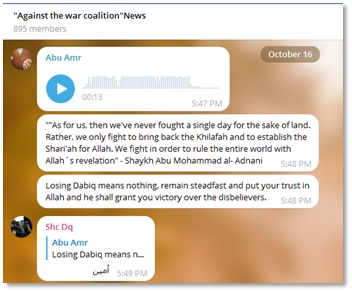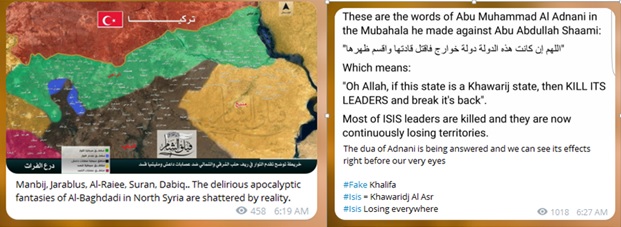Losing Dabiq: Potholes on the Road to the Apocalypse
The small, quiet town of Dabiq, nestled in the countryside of northern Syria about 10 miles from the border with Turkey, held little military or strategic significance until 2014, when the birth and lightning conquests of ISIS placed it on the political world map.
Islamic scripture prophesizes that an apocalyptic battle will take place at Dabiq between Muslim forces and their ‘Roman’ enemies (modernized by ISIS to mean the U.S. and Western countries). ISIS, from its inception, used that apocalyptic prophesy and its prediction of a final Muslim victory to link its state-building ambitions to Islamic theological and apocalyptic traditions, and to legitimize its declaration of a caliphate.
The Dabiq prophesy and narrative became a theme in ISIS propaganda and a powerful recruitment tool in and of itself.
 ISIS named its elaborate, English-language magazine after the city. The first issue alone tells the story of Dabiq twice—once at the beginning and once at the end—while each subsequent issue showcases an ominous 2004 quote on the Contents page from Abu Musab al-Zarqawi, founder of ISIS precursor group al-Qaeda in Iraq: “The spark has been lit here in Iraq, and its heat will continue to intensify—by Allah’s permission—until it burns the crusader armies in Dabiq.” The message is repeated in high-definition propaganda videos such as “No Respite.” Computer-generated fire balls explode behind the name of the city while the narrator gleefully tells English viewers that one day soon “…the flames of war will finally burn you on the hills of Dabiq. Bring it on!”
ISIS named its elaborate, English-language magazine after the city. The first issue alone tells the story of Dabiq twice—once at the beginning and once at the end—while each subsequent issue showcases an ominous 2004 quote on the Contents page from Abu Musab al-Zarqawi, founder of ISIS precursor group al-Qaeda in Iraq: “The spark has been lit here in Iraq, and its heat will continue to intensify—by Allah’s permission—until it burns the crusader armies in Dabiq.” The message is repeated in high-definition propaganda videos such as “No Respite.” Computer-generated fire balls explode behind the name of the city while the narrator gleefully tells English viewers that one day soon “…the flames of war will finally burn you on the hills of Dabiq. Bring it on!”
Dabiq was also prominently featured in video starring Mohammed Emwazi, a British citizens nicknamed “Jihadi John” who killed five Western hostages in 2014. In the video, Emwazi taunts viewers with the severed head of American aid worker Abdul-Rahman Kassig at his feet. “Here we are, burying the first American Crusader in Dabiq, eagerly waiting for the remainder of your armies to arrive,” he intones.
But ISIS’s Dabiq-centered narrative began to shift as the group began to experience significant military setbacks, such as the loss of Fallujah. Propaganda videos began to praise ISIS’s soldiers for fighting for their religion—not for human desires such as territory. To live and die for Islam out in the desert was a prize in and of itself, recruitment material claimed, and God would look favorably upon those who continued to fight for the caliphate.
In a May 2016 statement, former ISIS spokesman and head of external operations Abu Mohammed al-Adnani seemed to foreshadow the loss of Dabiq and other ISIS-held cities like Mosul and Raqqa when he claimed that ISIS did not rely on territory it controlled for its legitimacy.
On October 6, 2016, Syrian rebel forces, backed by Turkish armor and American air power, began an assault on Dabiq. For 10 days, ISIS forces attempted to hold their prized town, but on October 16, the coalition forced the last ISIS fighters out of Dabiq and retook the town.
ISIS did not acknowledge the fall of Dabiq, but the loss of a town in which the group placed so much symbolic and theological value cannot help but weaken the group’s image. ISIS attempted to draw attention away from the loss of Dabiq with propaganda focused on things like providing access to potable water within its territories. Pro-ISIS chats on Telegram, an encrypted messaging application and website, contained posts telling ISIS supporters to “remain steadfast” and “put your trust in [God].”
Yet anti-ISIS mujahideen and anti-ISIS activists were quick to produce and post material mocking the terrorist group and bolstering their own recruitment. Many treated the fall of Dabiq as a decisive blow to ISIS’s standing as an Islamic authority.

One member of a pro-ISIS chat encourages trust, another responds “Amen”

Raqqa Activist Group mocks ISIS in Tweet the morning Dabiq falls
Many of the responses included a firm denial that ISIS had ever represented a true Islamic caliphate. Anti-ISIS mujahideen groups who are competing for recruits and allegiances took the loss as an opportunity to discredit ISIS and bolster their own positions as true, strong Islamic authorities.

Anti-ISIS, Pro-Jihad Channel “Fighting Journalists” mocks ISIS after loss of Dabiq
Still, even after the defeat at Dabiq, some of the Islamic State’s online supporters continue to argue that the West is operating on a compressed timeline and ISIS’s withdrawal from Dabiq has nothing to do with the prophesized battle to come.
As concerning is ISIS’s continued ability to inspire attacks in Western countries, through its misuse of the Internet and online platforms. A recent French investigation revealed that through the encrypted messaging application Telegram, one ISIS recruiter in Syria or Iraq, 29-year-old French citizen Rachid Kassim, instructed and encouraged the attack that killed a French police couple in their home, the execution of a French priest during Mass, and the attempt to detonate a car bomb near Notre Dame Cathedral.
So, while ISIS's stature and military prowess may have taken a hit with the fall of Dabiq, its ability to terrorize has yet to be significantly diminished.
Stay up to date on our latest news.
Get the latest news on extremism and counter-extremism delivered to your inbox.